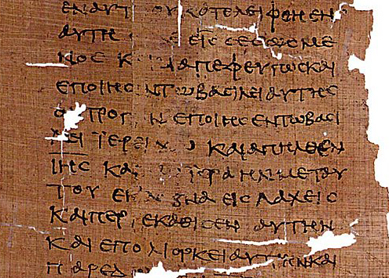The Septuagint is the Old Greek version of the Bible. It includes translations of all the books found in the Hebrew (Old Testament) canon, and as such it is the first known Bible translation. It also includes the so-called Apocryphal or deuterocanonical books, some translated from Hebrew originals and others originally composed in Greek.
It’s called the Septuagint after the Latin word for “seventy” (septuaginta). According to an old tradition (recounted in the Letter of Aristeas), the first five books of the Bible, known as the Pentateuch, were translated into Greek by about seventy elders sent to Egypt by the high priest Eleazar in Jerusalem at the request of King Ptolemy II Philadelphus of Alexandria, who wanted to add the Jewish Scriptures to his library. Although the story originally applied only to the Pentateuch, the tradition expanded to include the other books as well. In time, the entire Greek version came to be known as the Septuagint, or the version of “the Seventy,” and is abbreviated with the Roman numeral LXX (70).
This account was later used by Christians to defend the inspiration of the Septuagint against Jewish rabbis who disparaged its disagreements with the Hebrew text. Most scholars today agree that while the Pentateuch was translated in Egypt in the mid-third century B.C.E., Aristeas’s account is not authentic and postdates the translation by well over a century; it was probably written as propaganda to defend its authority. Yet there is some history in the tale: there was a large community of Jews living in Alexandria, and it is likely that the Pentateuch was translated for their benefit. The rest of the books followed gradually, probably over the course of several centuries.
One finds a range of translation styles in the books of the Septuagint, from very free to very literal. The identity of the various translators is not known, with one exception: according to its prologue, the book of Joshua ben Sira (known as Sirach or Ecclesiasticus) was translated by his grandson.
The Septuagint matters for many reasons. Its translators faced many of the same challenges and issues that today’s Bible translators do, so it forms an important resource for translation studies. It also helps us to understand how the Jews interpreted their Scriptures at an early stage. It translates a very early form of the Hebrew text and preserves important differences from surviving Hebrew manuscripts (notably the Masoretic Text). Furthermore, New Testament authors often quoted Old Testament passages from the Septuagint version, and their theological vocabulary—which via Latin became the vocabulary of Christian theology—often stems from the Septuagint. The Septuagint plus the New Testament became the Bible of Christianity and remains the version used in the Greek Orthodox Church. Its daughter versions have likewise been used over the centuries in the churches that used those languages. The Septuagint has fondly been called “Egypt’s greatest gift to Western civilization.”
Bibliography
- Jobes, Karen H., and Moises Silva. Invitation to the Septuagint. Grand Rapids, Mich.: Baker Academic, 2000.
- Pietersma, Albert, and Benjamin G. Wright, eds. A New English Translation of the Septuagint. New York: Oxford University Press, 2007, especially 619-20.
- Rahlfs, Alfred, and Robert Hanhart, eds. Septuaginta: Editio Altera. Stuttgart: Deutsche Bibelgesellschaft, 2006.





